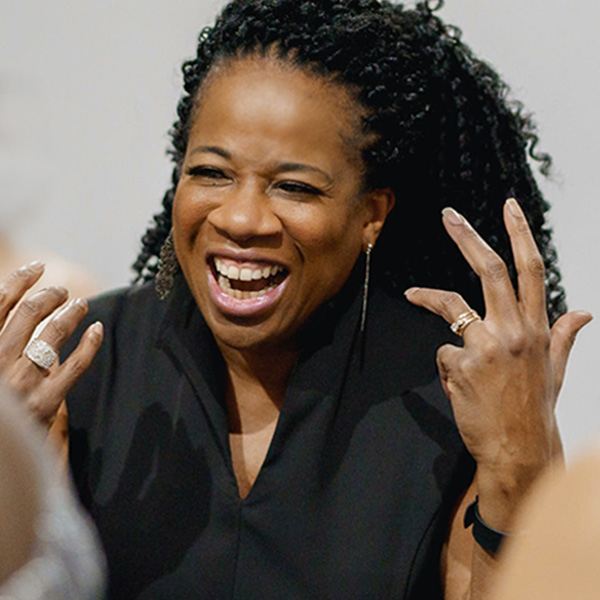Vancouver-born, Montreal-based Kid Koala (aka Eric San, BEd’96) has built up an international following for his imaginative and versatile output – but that output is hard to sum up in a quick and neat manner.
A creative polymath, Kid Koala is a DJ in the hip-hop tradition, but that’s only where his story begins.
He’s also a composer and producer, celebrated as a pioneering innovator of “turntable music.”
Using turntables as instruments to manipulate vinyl records, and incorporating mixers and samplers to repurpose sounds from original recordings, Kid Koala creates complex beats, rhythms, and melodies, adding live instrumentation throughout.
He has released 10 solo albums and collaborated with scores of musicians and rappers. His long résumé includes handling DJ duties with scratches and cuts for UK pop stars Gorillaz on their 2001 debut album.
He has contributed music to Hollywood films like The Great Gatsby and Looper, frequently working with director Edgar Wright (Kid Koala’s music appears in Shaun of the Dead and Scott Pilgrim vs. the World). The lead character in Wright’s Baby Driver puts together remixes and Wright turned to Kid Koala to provide those sounds.
Kid Koala has also composed music for video games, and even Sesame Street. His live performances can incorporate puppets, choreography, and live orchestral elements, and he has been the driving force behind inventive multimedia theatrical shows (one is about a young mosquito pursuing a career as a jazz clarinetist).
How “Mr. San” won over a tough group of sixth graders
His wide-ranging ingenuity finds its roots, in part, in the time he spent teaching what he describes as a particularly “sassy” sixth-grade class who knew him as “Mr. San”. He was pursuing a degree in elementary education at McGill at the time and he encountered the students during a teaching placement.
The experience helped give his talents a sense of direction as he was then still learning to perform and coming into his own as a recording artist. While pursuing his McGill degree, he was DJing on the side at student dorm parties and in clubs with his first band, Bullfrog. He was the Thursday night DJ at Gerts, McGill’s student pub.
“The class had creative writing time built into the curriculum,” says San. “Students could bring in a cassette, play their favourite songs, and then write for 20 minutes.”
He saw an opportunity to do something different. He introduced the instrumental version of rapper Coolio’s smash hit “Gangsta’s Paradise” to the class. With a 4-track recorder, students created their own versions with their own lyrics.
It proved to be a winning concept in the pre-digital era. Mr. San’s tough charges engaged enthusiastically, and his holistic, music-influenced curriculum took shape.
Students explored English by transcribing and analyzing lyrics and expressing their stories through writing. Recording lessons included elements of math and science. In phys-ed, students choreographed dance presentations, and in art, they crafted their album designs.
“For me, I was like, ‘Wow!’ I found this way to get through to them using music,” San says.
To this day, he and his collaborators “design experiences,” as he puts it, rather than simply play concerts for Kid Koala fans worldwide.
“The idea behind some of those classroom concepts is to present something in a way that people can engage with it. And it’s still part and parcel of how I design tours.”
The car ride that changed his life
He had his first big break in the music business while he was still a McGill student – largely by accident.
San had produced a demo cassette of his work. It was on the B-side of a cassette that was playing in a car while San was en route to pick up the pioneering UK electronic music duo Coldcut for a Canadian tour on which San was booked as a supporting act.
On the return drive, San was in the back seat when the tape flipped automatically, and his demo began to play. He hadn’t planned for that. The influential passengers sitting up front asked what it was, turned it up loudly, and rode on in silence as it played while an embarrassed San sat in the back seat.
“I thought they were just being polite,” he says, cringing at the memory.
A few weeks later, he received a call from Peter Quicke, the manager for Coldcut’s prestigious London-based electronic label Ninja Tune, inviting San to join.
His demo was completed and released by Ninja Tune as his official label debut, Scratchcratchratchatch, in 1996.
His music next caught the attention of frequent Beastie Boys collaborator “Money Mark” Nishita.
San had ordered a copy of Money Mark’s solo project. Several weeks later, he sent the keyboard whiz a copy of the demo along with a polite letter mentioning he’d never actually received Money Mark’s record.
“One day, I got this call. And someone says, ‘Hey, is that Eric? It’s Mark!’”
San thought it was one of his bandmates, only realizing after chatting for a bit that this was a different Mark.
“It’s Money Mark from LA! I listened to your tape, and I was really into it. If you’re available, do you want to come play turntables with me in my band?”
The opportunity brought Kid Koala to a new audience as Money Mark’s band (which also featured Sean Lennon on guitar) spent 1999 opening for the Beastie Boys on a stadium tour that included hip hop legends A Tribe Called Quest.
Opportunity continued to knock. As his reputation grew, Kid Koala was handpicked by Radiohead to support their tour.
He soon found himself recording with some of his biggest teen influences. Among them was the legendary hip hop beatmaker Prince Paul, whose early work with De La Soul had a profound effect on a very young San, who emulated the group’s sound while learning to scratch and sample in his childhood bedroom.
“Guys like Mark, Paul, and Dan (the Automator) are mentors,” San says.
At this point in his career, San is now someone that younger musicians look up to. His 2000 release Carpal Tunnel Syndrome was selected for the 2018 Slaight Family Polaris Heritage Prize, a distinction reserved for landmark albums by Canadian artists (other past winners of the prize include Joni Mitchell, Neil Young and Leonard Cohen, BA’55, DLitt’92).
A new album (with a little something extra)
His most recent album, Creatures of the Late Afternoon, has been attracting some of the strongest reviews of his career. Uncut describes it as “warm, fuzzy and delicious,” while All Music praises it as a “stylistically varied, adventurous and straight-up fun release.” It is also, in some ways, one of San’s most personal works. Popmatters calls it “a touching ode to his parents.”
His father, Richard San, BSc’68, was a cancer researcher, while his mother, Mimi San, worked as an accountant. They shared their love of film and music with their children, and both encouraged San as he developed his talents (without always necessarily understanding them).
“I kind of had this steady diet of appreciation for the joy that music and movies bring,” says San. “And underneath, there’s this sort of really pragmatic side I get from my mom, and a sillier side I get from my dad.”
“And my work ethic, I get [that] from both of them. Because they were really hard-working parents who wanted to give us an opportunity as kids.”
Like many of his preceding projects, Creatures is more than just a simple album.
Nufonia, released in 2003, included a comic book, later expanded into a full graphic novel. The packaging for 2012’s 12-Bit Blues turns into a scale-modelled, fully functional gramophone.
And the vinyl pressing of Creatures is a multi-player family board game, created and crafted entirely by San, his wife and their two daughters.
During the height of the COVID pandemic, he explains, the family spent hours each day playing board games.
Together in their living room, they conceived their own game, wherein each player’s objective is to make a song, with challenges and silly side quests (such as staring contests) along the way.
San’s reasoning for pairing such an unorthodox item with his new album is, unsurprisingly, very simple.
“Board games are fun!”


